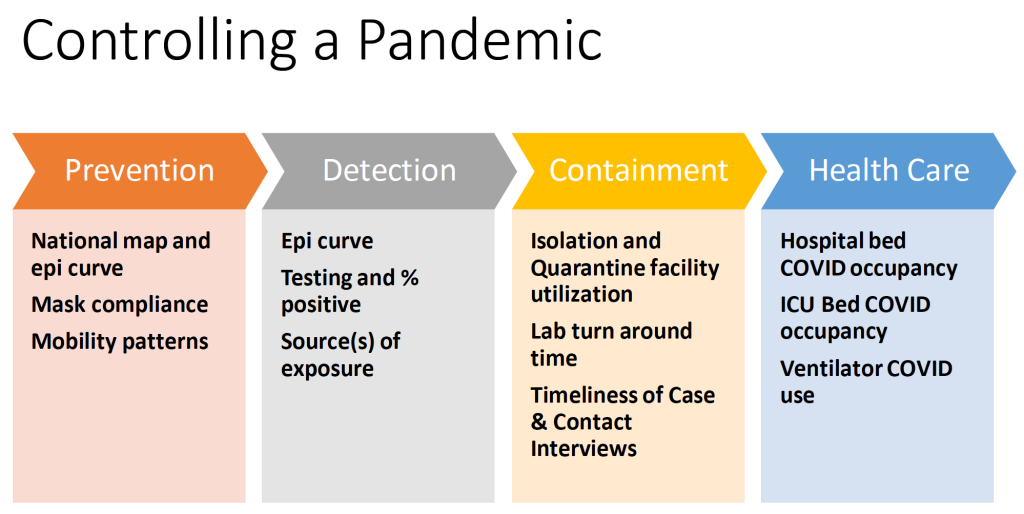Kaua‘i District Health Officer Assists in Development of COVID-19 Information Online Dashboard
At an afternoon briefing to legislators, Gov. David Ige and representatives from the Hawai‘i Department of Health and the University of Hawai‘i unveiled a new COVID-19 dashboard for anyone interested in tracking local data associated with the coronavirus pandemic.
This dashboard can be accessed at www.hawaiicovid19.com
“This is a tremendous step forward in providing vital information in an easy-to-read and understand format. It immediately improves our ability to provide key metrics about how Hawai‘i is performing in our fight against COVID-19 and offers data to aid in decision-making,” Governor Ige stated.
Kaua‘i District Health Officer Janet Berreman, one of numerous collaborators who developed the dashboard, said the dashboard responds to several needs.
“There are many places where the public and policy-makers can obtain different pieces of the data. This is a central, go-to source for information from multiple sources,” Berreman explained. Additionally, she says the dashboard provides the ability to monitor COVID-19 indicators across the full spectrum of disease control actions: prevention, detection, containment, and treatment, rather than focusing narrowly on just one.
The new metrics now available include:
-ICU bed and ventilator use by COVID patients: total number and percent of capacity.
-Occupancy and capacity of Isolation and Quarantine facilities (for those who cannot isolate or quarantine at home).
-Contact tracing capacity and currently active/trained tracers, by county.
-Testing capacity and turn-around time.
-PPE supplies and distribution.
-Modes of transmission with number of cases and clusters for each.
-Mask-wearing behavior (Honolulu; all islands in process)
Data for the dashboard is being pulled from multiple sources and will be updated daily or weekly, depending on the sources from which the information is derived. The dashboard will continue to be a collaborative process involving DOH and key partners sharing timely and accurate information with the public.
Edward Mersereau, deputy director of the Dept. of Health’s Behavioral Health Administration, provided more detail on the four action areas.
“While we know there is currently no cure or vaccine to control spread, every success we experience in prevention, detection, containment and treatment means less burden on public health and the health care system,” Mersereau said. “Tracking how measures in the four areas are having the impact we are seeking helps to guide where our efforts are effective and where they are not. People will be able to see whether or not policies and strategies are having the intended impact and will be more empowered to make informed decisions for their personal wellbeing in this pandemic.”

The dashboard seeks to inform the community and policy makers on four key action areas essential to stopping the pandemic:
Prevention: depicts the impact that individual and community behaviors such as mask wearing and physical distancing on keeping the virus from spreading. Prevention is essential in fighting the pandemic but often the most difficult to track because they largely relate to personal behavior and choices.
Detection: depicts how much disease is present in Hawai‘i, the types of activities or venues that are resulting in disease transmission, and whether it is increasing or decreasing and how rapidly. This information allows policy makers to tailor their actions and the public to engage in safe practices.
Containment: pulls together various parts of a complicated system to help people understand the status of contact tracing, lab testing results, quarantines, and other disease-limiting measures. These measures, taken together, are an important part of controlling the pandemic.
Treatment and health care: shows data on hospitals and ICU beds, ventilator use and availability of personal protective equipment (PPE). From this information the public and policy makers can understand how burdened the health care system is, and how prepared it is to manage an influx of COVID-19 patients.
“This dashboard is a multi-faceted depiction of all the moving parts associated with pandemic management and response in one place,” Ige said. “My hope is this will provide greater understanding and appreciation of the complexity of dealing with this unprecedented public health crisis and help get Hawai‘i back on the road to health and economic recovery as soon as possible.”





